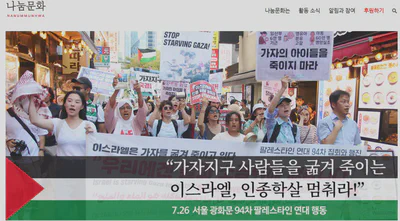Seoul’s pragmatic Palestine dance

Just yesterday, the head of the table said grace. He went beyond acknowledgement and thanks for the food to include a prayer for the strength and protection of the State of Israel. Before my first mouthful (and I eat real fast), a close friend raised her voice to say that we should all be praying for the Palestinian people. It was on—the first time I’d seen the Palestine/Israel issue raised in Korea. Is Seoul’s delicate pragmatic Palestine dance about to break?
South Korea’s diplomatic engagement with Palestine is one of careful calibration. While it hasn’t formally recognized the “State of Palestine,” it does acknowledge the Palestinian National Authority as the sole representative of the Palestinian people. In recent years, Seoul has consistently voted in favor of UN resolutions supporting a two-state solution and has provided significant humanitarian aid.
It’s a responsible and pragmatic diplomatic profile (note Lee’s “pragmatic” diplomacy is a declaration of the obvious for anyone who’s watched South Korea’s foreign policy longer than two and a half years). It doesn’t necessarily alienate its primary security guarantor, the United States; but it’s also not an enabler, voting for every UN resolution in support of Israel along with the U.S, like Australia, Micronesia, and the Federated States of Micronesia. It’s above all strategic—aimed at navigating the geopolitical maze of the Middle East while protecting its own vital interests.
Yet, public opinion in South Korea is changing. Recent news events in Gaza, have led to a noticeable increase in public sympathy for Palestine. My friend raised Tucker Carlson’s video interview with Tony Aguilar as her awakening. It is pretty difficult to watch and not be emotionally moved.
She then turned to civil society groups, such as Nanum, to look into the issue. Some have been advocating for a long time. The current situation has led to them coalescing on the issue. They stage protests in front of the Israeli embassy, stand vigils at popular Subway entrances or cultural events, and spread the word online.

However, this emerging public sentiment, while powerful in its moral weight, will be difficult to translate into a seismic shift in foreign policy.
First, the specter of potential U.S. retribution looms large. South Korea’s foreign policy is inextricably linked to its alliance with the United States. Any move perceived as a significant departure from Washington’s position on the Israeli-Palestinian conflict could carry severe consequences. We need only look at the recent example of Canada. When Canadian Prime Minister Mark Carney announced his country’s plan to formally recognize a Palestinian state at the UN General Assembly, it was met with immediate backlash from the U.S. President Donald Trump, who publicly threatened to impose a 35% tariff on Canadian goods, putting a major trade deal at risk.
In 2-3 weeks, the South Korean president plans to visit the White House and meet with Donald Trump. Want to lob a frag into the room? Simply follow Canada’s example anytime before that meeting. President Lee would get dressed down like a schoolkid. Those tariffs would yo-yo—and not in “two weeks”, but as soon as Trump could get onto his cell phone for a Truth Social post and thank everyone for the attention.
For a country like South Korea, which relies on the U.S. for its security against North Korea and is deeply integrated into the global economic system, such a risk is almost unimaginable. The potential for trade sanctions or a weakening of the U.S. security commitment would be a price too high to pay for a shift in policy on an issue that, while important, isn’t a direct national security threat.
Second, the nature of South Korean public opinion on this issue is more reactive than proactive. While many Koreans recoil from the images of suffering in Gaza, a 2024 survey showed that while a majority of South Koreans agreed that providing humanitarian aid to Palestine was important, a larger percentage opposed direct intervention or sending even non-combat troops.
The Palestinian plight, due to significant linguistic, geographic, and cultural distance, isn’t a primary concern for most South Koreans. The national conversation is dominated by domestic issues, the economy, and the ever-present threat from North Korea. This means that while public outcry can be intense in response to a specific event, it often lacks the sustained momentum and political organization required to force a change in government policy.
Religious attitudes also play a role. South Korea’s large evangelical Christian population is often subtly or explicitly pro-Israel, influenced by biblical eschatology and U.S. missionary ties. While not dominant, this influence tempers the tone of many public debates and reinforces the idea that Palestine is someone else’s problem.
Arguably, the cultural “village mentality” also plays a role. This worldview tends to divide the world into insiders and outsiders, focusing emotional and moral concern inward toward family, region, and nation. While many South Koreans express sympathy when confronted with images of Palestinian suffering, this empathy rarely transforms into activism or foreign policy pressure, because Palestine feels distant—culturally, religiously, and historically. Without shared identity markers or diaspora ties, Palestine remains an “outsider” issue, evoking compassion but not obligation.
Additionally, the village mentality encourages social conformity and risk aversion, making it unlikely that individuals or institutions will push for politically costly positions—especially those that could strain ties with the United States. And while it’s rapidly changing, even within progressive civil society, pro-Palestinian activism remains cautious. In this context, moral concern is often compartmentalized: people donate or pray, but they stop short of demanding systemic change.
The result is a posture of responsible diplomacy and emotional sympathy, without political action—a reflection not just of geopolitical constraints, but of deep-seated cultural habits that prioritize social cohesion over distant moral crusades.
A similar situation was seen when calls to support Ukraine with direct munitions donations were made. South Korea was willing to sell munitions to Poland, the U.S. and Germany who could then donate them. The risk to its national interest was just too high a price to pay.
Third, it’s just not in South Korea’s foreign policy tradition. As much as South Korea portrays itself as a “middle power” and champions democratic values, this has always been tempered by national interest. The idea that middle power “good international citizenship” was always self-interested moral posing may be true, but Seoul takes it to the extremes, reaching near mercantile status.
South Korea’s foreign foreign policy is guided more by economic pragmatism and alliance management than values. Its engagement with Myanmar, Saudi Arabia, or China is rarely constrained by human rights concerns. Even in North Korea policy, humanitarianism is often a rhetorical device rather than a strategic objective.
Palestine is no different. While South Korea may fund UNRWA or vote for ceasefire resolutions, it will not jeopardize trade, defense, or diplomatic relationships over human rights. Nor does it see itself as a moral leader on this issue. A strong stance on Palestine, with its potential to disrupt relations with Israel and the U.S., would represent a fundamental break from this long-standing and relatively successful approach.
What we have here is a masterclass in cautious pragmatism. South Korea is a nation that has consistently sought to balance relationships, provide limited humanitarian assistance, and advocate for peaceful solutions without taking a firm stance that could jeopardize its core interests.
Recent increases in public concern for the Palestinian plight is a significant and heartening development, it’s unlikely to translate into a shift in political action—and it would be incredibly daring (some would say foolish) to do so before the planned summit meeting with Trump.
The potential for U.S. retribution, the reactive nature of public opinion, and a deeply embedded foreign policy tradition that prioritizes national security and economic stability over human rights will likely keep South Korea on its current, carefully navigated pragmatic path.
